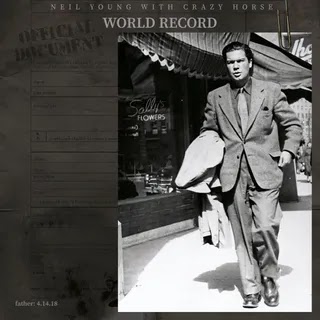Co-produced by Rick Rubin, Neil Young’s 42nd album is a mellow, off-kilter collection about the environment, mourning what’s already been lost while expressing a modicum of hope.
Downtime is a foreign concept to Neil Young. He’s been in constant motion ever since Buffalo Springfield broke up way back in 1968, dividing his time between the studio and the stage, making more music than could be released in a given calendar year. World Record, his 42nd studio album, arrives less than a year after Barn, the album he knocked out at a studio in his newly adopted home in the Rocky Mountains—a place so dear to his heart, he named his 2019 reunion with his longtime running partners Crazy Horse after the state of Colorado.
Colorado appeared just prior to the arrival of COVID-19, the pandemic being the one thing to force Young off the road. He channeled his energy into combing through his vast archive—World Record is the seventh Neil record to appear in 2022, with a 50th-anniversary edition of his 1972 landmark Harvest following hot on its heels—grounding himself by taking breaks to commune with nature. As he walked with his dog, he discovered himself whistling melodies he couldn't quite place. He'd capture those nascent tunes on an old flip phone, pairing the music with words written at a later date. As he wrote the lyrics, a common theme arose: Every song was about the environment.
The resulting World Record bears a title as plainly self-explanatory as Barn: That album was made in a barn; this is a record about the planet. It’s familiar territory for Young. Long an environmental advocate—his early standard “After the Gold Rush” imagined surviving a world turned against itself—the state of the planet has been at the forefront of his mind during the past decade, driving the 2015 anti-corporate farming protest The Monsanto Years and its accompanying bizarro live album EARTH, both recorded with Lukas Nelson and Promise of the Real. Unlike those records, Young isn’t in a political mood here. He spends his time on World Record ruminating over the effects of climate change, mourning what’s already been lost while expressing a modicum of hope, one that’s founded in the notion that love—love of the earth and of each other—is paramount.
Fittingly, Young recorded these songs with the band he loves best, the shambling, shaggy outfit Crazy Horse, which has featured guitarist Nils Lofgren since Frank “Poncho” Sampedro retired in 2014. Seeking to preserve the spontaneity at the heart of the Horse, Young brought the group to Rick Rubin’s Shangri-La Studios in Malibu—the same place he cut the politically charged Peace Trail in 2016—this time retaining the services of Rubin as a co-producer. The plan was simple: to record the 10 songs “live in order,” thereby capturing the group as they slowly gain momentum. Another wrench in the works was Young’s decision to play guitar on only three songs, otherwise devoting himself to either piano or pump organ. The instrumentation gives the album an amiable, off-kilter gait; it often seems like the band is on the verge of stumbling over its own feet, righted either by hammered keyboards from Young, a wallop from drummer Ralph Molina, or by a net woven by the guitars of Lofgren and Billy Talbot.
At first, World Record seems to coast by on its mood; there’s a bittersweet undercurrent flowing through the album but the weathered humanity of Crazy Horse always pulls the music away from melancholy. Often, the band feels like they’re deliberately avoiding their old tricks, finding new ways to arrive at the same destination. Generally, the proceedings have a light touch, a gentleness that is readily apparent on the opening shuffle “Love Earth” but also on the thicker rock’n’roll of “The World (Is in Trouble Now),” a warning call that vaguely echoes Herbie Hancock’s jazz classic “Watermelon Man” on its refrain. The mellow glow suits a band who is keenly aware of their long history and their advanced years—in an interview with The New Yorker to promote World Record, Young says retirement “doesn’t seem out of the realm of possibility”—and the relaxed sound is a distinct variation within their body of work: Young and Crazy Horse rarely sound as at ease as they do here.
All of this genial warmth makes the closing “Chevrolet” hit harder. One of the band’s patented extended guitar workouts, “Chevrolet” feels like a collective exhale from Crazy Horse: They’ve spent the rest of the record on good behavior, now they finally get to push amps to a breaking point while Young rhapsodizes about old cars. “Chevrolet” sticks out like a gas guzzler at a nature reserve: It’s long, loud, and dirty, a celebration of everything the rest of the record rejects. It’s always been a bit difficult to reconcile Young’s environmental advocacy with his love of automobiles, and a close listen to “Chevrolet” reveals that he too is attempting to square that circle. Over the course of its 15 minutes, Young takes stock of what’s been lost over the past 50 years, still exalted by the open roads but reconciled that it’s now a memory: “Gone is crowded highway, lost are the roads we left behind/Found in the place they live inside me.” With that line, the connection between “Chevrolet” and the rest of World Record is clear: It’s an album of acceptance, where Young takes a look at his life and his planet and decides there’s still a lot of love.



0 comments:
Post a Comment